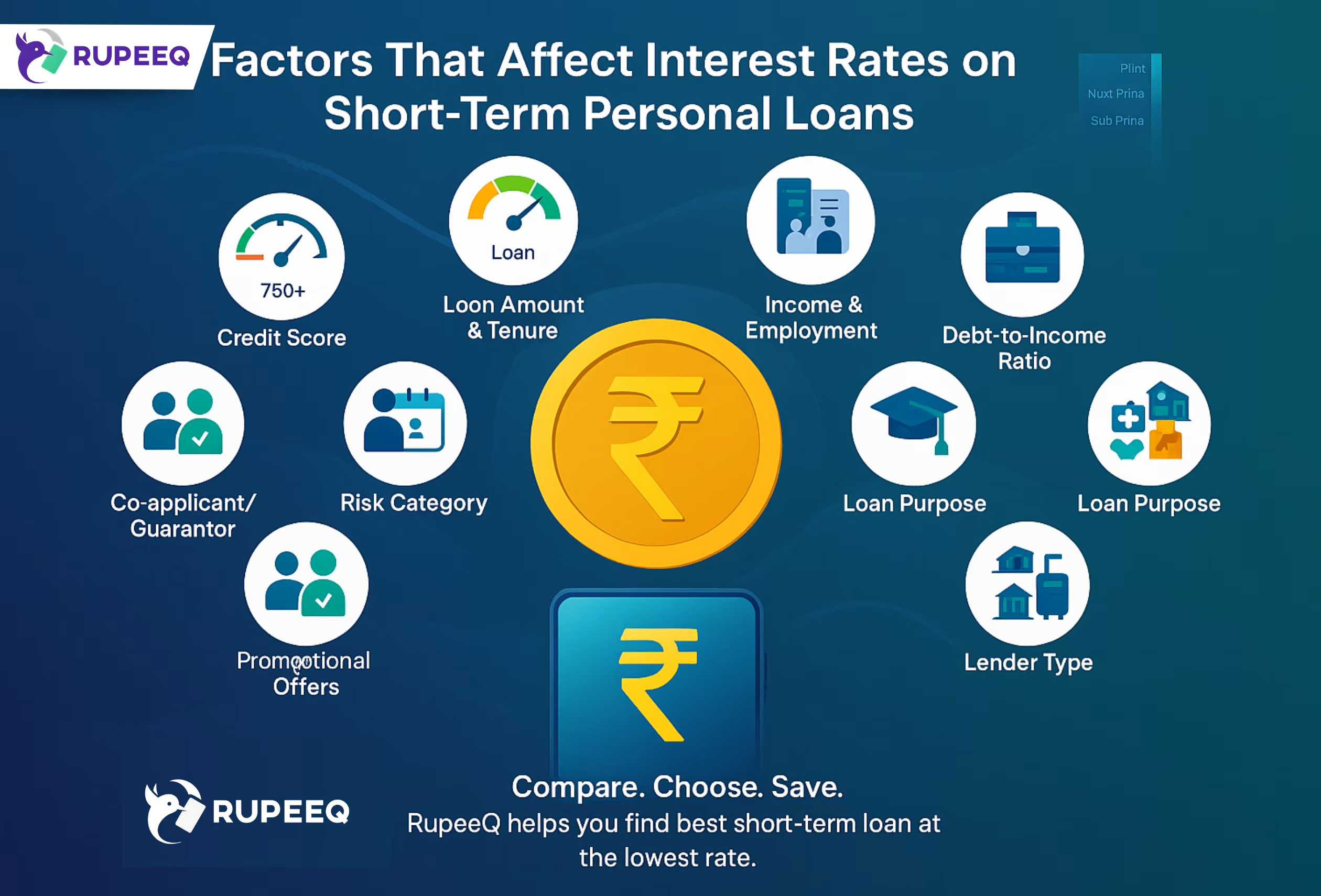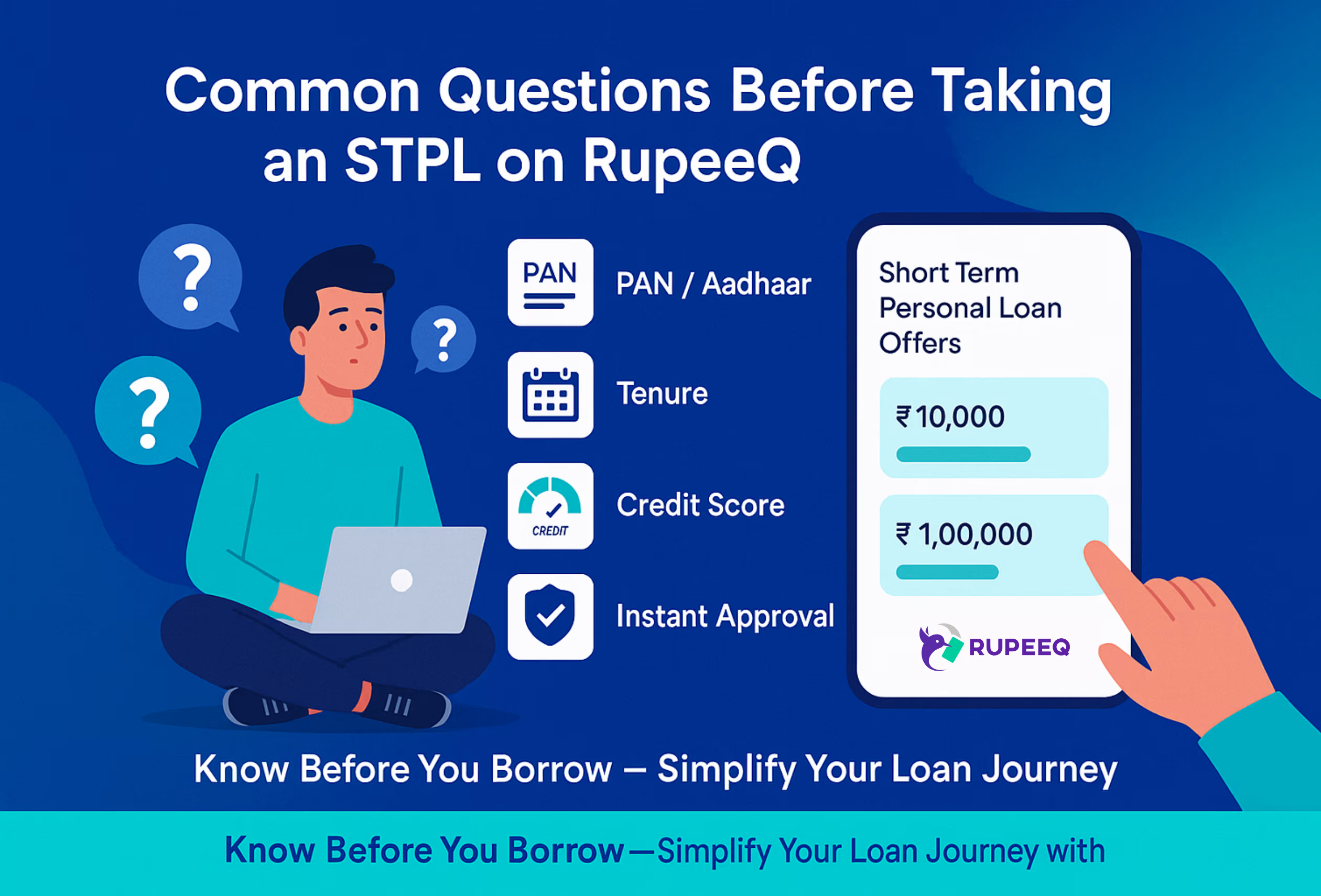Personal loans are a convenient financial solution for a variety of needs, from medical emergencies to home renovations or debt consolidation. However, one of the most crucial aspects to consider when applying for a personal loan is the interest rate. The interest rate you receive can significantly affect the overall cost of borrowing and your monthly payments. So, what determines the interest rate you’ll be offered? In this blog, we’ll dive into the top factors that influence your personal loan interest rate and provide practical RupeeQ tips to secure the best possible rate.
Your Credit Score:
Your credit score is one of the most important factors lenders consider when setting your interest rate. A high credit score signals to lenders that you are a responsible borrower, reducing their risk and often resulting in lower interest rates. On the other hand, a low credit score indicates higher risk, which may lead to higher interest rates.
- Excellent Credit (750 and above): You are likely to receive the most favorable interest rates.
- Good Credit (700-749): You may still qualify for competitive rates.
- Fair Credit (650-699): Interest rates may be higher, and some lenders may be hesitant to approve your loan.
- Poor Credit (below 650): You’ll face the highest rates or may need a co-signer to qualify.
RupeeQ Tip: Check your credit score regularly using RupeeQ ACE. If your score is low, take steps to improve it before applying for a loan, such as paying off outstanding debts and correcting any errors on your credit report.
Your Income and Employment Stability:
Lenders want to ensure you have a steady and reliable source of income to repay your loan. Your income level and employment history play a significant role in determining your interest rate. Stable employment and a higher income can make you a more attractive borrower and may result in lower rates.
- High Income: A high income assures lenders of your repayment ability, often leading to better loan terms.
- Employment History: Long-term employment at a reputable company can positively impact your rate. Frequent job changes may be a red flag for some lenders.
RupeeQ Tip: If you’re planning to switch jobs, consider applying for a loan beforehand. Lenders prefer applicants with a stable employment record.
Loan Amount and Tenure:
The amount you wish to borrow and the repayment tenure you choose can also affect your interest rate. Generally, a higher loan amount may attract a lower rate, as lenders earn more interest over time. However, longer tenures can increase the total interest paid, even if the rate is lower.
- Shorter Tenure: While the EMIs may be higher, a shorter repayment period often comes with a lower interest rate.
- Longer Tenure: Lower EMIs may seem attractive, but the interest rate may be higher, and you’ll pay more interest overall.
Your Debt-to-Income Ratio (DTI):
Your debt-to-income (DTI) ratio measures the percentage of your income that goes toward repaying existing debts. A lower DTI ratio indicates better financial health and reassures lenders that you can handle additional debt comfortably.
- Low DTI (Below 30%): This shows you have manageable debt levels, making you eligible for lower interest rates.
- High DTI (Above 40%): A high DTI may raise concerns about your ability to repay, leading to higher interest rates.
RupeeQ Tip: Pay off smaller debts to lower your DTI before applying for a personal loan. This simple step can make you a more attractive borrower.
Lender’s Policies and Market Conditions:
Interest rates are also influenced by a lender’s internal policies and external economic factors. For example, in a high-inflation environment, interest rates tend to increase. Additionally, different lenders have varying risk appetites and pricing strategies, which can result in varying interest rates for the same borrower profile.
- Bank vs. NBFC: Banks may offer lower rates but have stricter eligibility criteria. Non-Banking Financial Companies (NBFCs) may be more flexible but may charge higher rates.
- Economic Trends: During periods of economic uncertainty, interest rates may fluctuate based on inflation and changes in the Reserve Bank of India’s (RBI) policy rates.
RupeeQ Tip: Stay updated on economic trends and compare loan offers from multiple lenders. RupeeQ’s loan comparison tool can help you find the most competitive rates available.
Your Relationship with the Lender:
If you have an existing relationship with a lender, such as a savings account or previous loans, you may be eligible for preferential interest rates. Banks and financial institutions often reward loyal customers with better loan terms.
- Existing Accounts: If you’ve been a loyal customer with a clean track record, your lender may offer you a lower rate.
- Pre-approved Offers: Check with your bank for any pre-approved personal loan offers that come with lower rates.
Loan Purpose
Though personal loans are generally flexible and can be used for various purposes, some lenders may offer better rates for specific needs, such as home renovation or debt consolidation. This is because certain uses may be perceived as lower risk compared to others, like funding a vacation or starting a new business.
- Debt Consolidation: Loans used to consolidate and pay off high-interest debt may have more favorable terms.
- Emergency Expenses: Loans for medical emergencies or urgent repairs may not have preferential rates but could be approved more quickly.
Final Thoughts: How to Get the Best Personal Loan Interest Rate
Securing a favorable interest rate on your personal loan can save you a significant amount of money. To improve your chances, maintain a good credit score, ensure your finances are in order, and compare multiple offers before committing to a loan.
Don’t rush the process. Take advantage of the RupeeQ website to compare lenders, calculate your EMIs, and choose a loan that aligns with your financial goals. Making an informed decision today can lead to substantial savings in the future. By understanding the factors that influence personal loan interest rates, you’re better equipped to negotiate terms and make smart borrowing decisions. Happy loan hunting!







